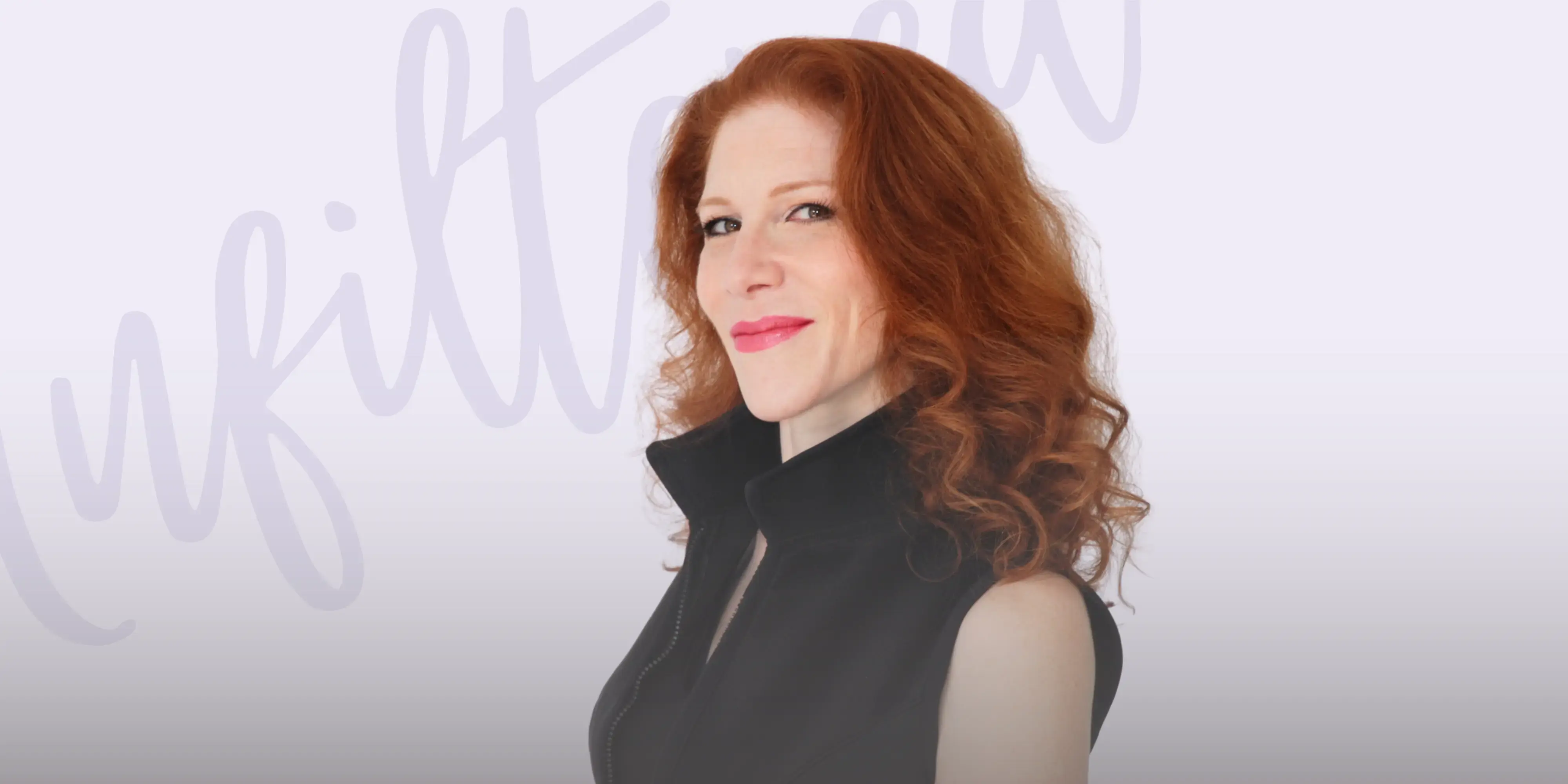If you've ever walked away from a fight with your partner feeling more distant than before, you're not alone. Over time, even the most loving relationships can struggle with miscommunication, emotional disconnection, and recurring conflicts.
This week on the Sofia Unfiltered podcast, we sat down with certified sex and relationship coach Kristen O’Guin to unpack the science and strategy behind long-term relationship success. From making emotional bids to fighting fair, Kristen reveals what it takes to turn conflict into connection—and how to repair and deepen your bond, no matter how long you’ve been together.
What causes communication breakdowns in long-term relationships?
Over time, stress, unmet needs, and misinterpreted behaviors can erode connection and lead to resentment or emotional withdrawal.
As Kristen shared, “So when the conflict happens, if the sympathetic nervous system is triggered, the blood in the brain starts moving away from the frontal lobe, which is where we have emotional regulation impulses control the ability to reason and use logic...so people are getting triggered into a state where it's literally harder for them to think.It's harder for them to control emotions or impulses.” When we feel misunderstood, dismissed, or attacked, our nervous systems go into fight-or-flight mode. That makes it nearly impossible to listen, much less connect.
Common causes include:
- Avoiding conflict or hard conversations
- Scorekeeping or holding grudges
- Disconnection from physical intimacy
- Busy schedules replacing intentional time together
- Differences in communication or attachment styles
“If couples could just have this underlying understanding that you’re both on the same team… we can navigate it together,” Kristen explains. “That is just so huge for all of these different patterns and dynamics.”
If you’re navigating this in your relationship, consider working with a Counselor or Relationship Coach on Sofia Health to rebuild healthy communication patterns.
What are adult attachment styles?
One of the most transformative tools for better communication in relationships is understanding your and your partner's attachment style.
Attachment theory explains how our early experiences with caregivers shape the way we seek closeness, express needs, and handle emotional stress in adult relationships. Knowing these patterns helps couples move from misunderstanding to deeper empathy.
The three main adult attachment styles:
1. Secure attachment
Core traits: Comfortable with intimacy, emotionally available, able to express needs clearly.
Communication tips:
- Keep doing what works: openness, calm tone, and clarity.
- Practice holding space for partners with different styles without taking things personally.
- Offer reassurance without over-functioning.
2. Anxious attachment
Core traits: Fears of abandonment, heightened sensitivity to perceived disconnection, seeks frequent reassurance.
Communication tips:
- Offer consistent emotional check-ins (e.g., “I’m still here—I love you.”).
- Use grounding phrases during conflict: “We’re okay. Let’s take a moment and come back to this.”
- Encourage self-soothing practices like journaling or body-based calming tools.
3. Avoidant attachment
Core traits: Discomfort with too much closeness, needs space under stress, may withdraw during conflict.
Communication tips:
- Respect the need for space but agree on a “come back” time to resume the conversation.
- Be direct but non-confrontational; avoid blame-based language.
- Focus on shared goals to frame difficult topics (“We both want more ease at home…”).
Many recurring arguments aren’t about content—they’re about style. Attachment theory gives you a framework to interpret behavior with more compassion and to change how you show up, so both partners feel safe, heard, and emotionally met.
How can you fight fair in a relationship?
Fighting fair means expressing your feelings without blame, listening with empathy, and resolving the issue—not attacking the person.
In fact, most couples don’t need fewer arguments—they need better arguments. Fighting fair is about addressing conflict without causing damage. Here’s the recommended framework to help guide couples through disagreements:
The fair-fighting formula:
- Use “I” statements: Say “I felt hurt when…” instead of “You always…”
- Avoid name-calling or character attacks
- Pause if needed: Take a 20-minute break if your nervous system is activated.
- Repair the rupture: Return and reflect with empathy and accountability.
Want help implementing this? Book a session with a Life Coach or explore communication-focused sessions with Health Coaches on Sofia Health.
What are emotional bids—and why do they matter?
Emotional bids are small, daily attempts to connect. How your partner responds determines long-term intimacy and satisfaction.
Coined by Dr. John Gottman, “emotional bids” are gestures like:
- Asking “How was your day?”
- Reaching for a hand
- Sending a silly meme or inside joke
- Saying “I had a hard moment today…”
The response matters more than the bid itself:
- Turning toward: You acknowledge the bid with presence or warmth (even a simple “Tell me more”). This builds trust and emotional closeness.
- Turning away: Ignoring or brushing it off, often unintentionally, can leave your partner feeling unseen or unimportant.
- Turning against: Reacting with irritation or criticism can make your partner feel rejected and unsafe bringing up future needs.
“A huge part of why it can be harder for people to communicate... is because of the modern day lifestyle... people will nurture connection and communication a lot more [early on],” Kristen says.
Build awareness by noticing these daily interactions. And if you need support identifying or responding to emotional bids, explore sessions with Integrative Coaches.
How do you repair after a fight?
Relationship repair involves acknowledgment, accountability, and emotional reconnection—not just saying "I'm sorry."
Most couples skip the repair phase—and that’s what leaves wounds open. Effective repair includes:
Acknowledging impact (not just intent): “I see how my words hurt you…”
Validating your partner’s emotions
Apologizing for your part
Making a plan to do better next time
“Preventing conflicts by having times where you’ve set aside for communication can be super helpful,” says Kristen.
Working with an Energy Healer can help you identify emotional wounds and guide the healing process—especially if past trauma is being triggered in the relationship.
How can couples deepen intimacy without “fixing” everything?
You don’t have to solve every problem—just stay emotionally attuned and connected in the hard moments.
Kristen says it’s a myth that couples need to agree on everything. Instead, what matters is feeling seen, heard, and emotionally safe.
Tools to deepen intimacy:
Daily check-ins: “How are we doing today?”Rituals of connection: Morning coffee together, hugs before leaving, 5-minute cuddles
Physical touch and affection
Mindful breathing or meditation together
Try a Meditation Session for couples on Sofia Health to co-regulate and reconnect through body-based practices.
What’s the best way to communicate needs without guilt or shame?
Use non-defensive, clear language that frames your needs as pathways to deeper connection—not complaints.
So many people feel guilty for having needs, but Kristen reassures her clients that, “It’s okay to have needs. It’s healthy for you to recognize your needs and communicate them to others.” Many relationship experts encourage couples to use “connection-based” language instead of “problem-based” framing.
- Problem-based: “You never spend time with me.”
- Connection-based: “I miss feeling close to you. Can we set a time to connect this week?”
Kristen’s tip: “We both want both of our needs to be met... If they can approach it as a team—like, ‘okay, what are your feelings? What are your needs?’—that is just so huge.”
How can you tell if a relationship is emotionally safe?
Emotional safety feels like trust, consistency, and the freedom to be fully yourself without fear of criticism or rejection.
Signs of emotional safety:
You can disagree without fearYour emotions are respected, not minimized
You’re not walking on eggshells
You feel heard even when you’re vulnerable
Kristen explains: “When the conflict happens, if the sympathetic nervous system is triggered... you’re not going to get anywhere in that kind of argument.”
Sample Scenario: When the Same Fight Keeps Happening
Let’s say one partner constantly feels ignored when the other is on their phone. It turns into the same argument every week:
Partner A makes a sarcastic comment (“Nice to see you glued to your phone again”)
Partner B gets defensive (“I just had a long day!”)
Both shut down or explode
Kristen’s reframing:
Partner A: “When we’re both on our phones, I feel disconnected. I really value our time together.”Partner B: “Thanks for telling me. Let’s put phones away for dinner and reconnect.”
This one shift—from criticism to vulnerability—can defuse conflict and build connection.
What if one partner won’t communicate?
Start by shifting your approach. When one person models emotional safety, it can invite the other to open up.
It’s easy to feel helpless if your partner avoids emotional conversations. Kristen recommends recognizing the pattern of arguments and emphasizing that you are on the same team. This could look like:
Dropping the need to “fix” and focusing on curiosity
Creating calm, non-confrontational spaces
Asking open-ended questions like, “What’s been on your mind lately?”
Tools & Resources to Strengthen Your Relationship
Sofia Health offers hundreds of providers and tools to support communication, connection, and intimacy:
Explore Coaches for couples
Join Yoga Classes that improve co-regulation and connection
Book with Energy Healers for emotional clarity
Get support from Health Coaches for nervous system support
Shop Guides & Products on relationships and communication
Whether you’re in a new relationship or decades in, you don’t have to navigate it alone.
Top Tips for Better Communication in Long-Term Relationships
Slow down your responses. Pause, breathe, then speak.Repair more than you rupture. Conflict is normal—repair is vital.
Listen to understand, not to win.
Make emotional bids daily. They matter more than grand gestures.
Say what you need—without blame. Your needs are worthy.
“Once couples have the willingness... once they decide, ‘we’re going to be better at conflict, we’re going to be better at communication’—it’s huge in how much it shifts things,” Kristen reminds us.
Get Personalized Relationship and Communication Support
Sofia Health offers access to experienced relationship coaches and therapists who help couples struggling to communicate clearly or feeling disconnected navigate conflict, deepen emotional understanding, and rebuild trust. Whether you're seeking support together or doing the personal work on your own, our expert practitioners are here to guide you toward stronger, more fulfilling relationships.You can even shop the Sofia Marketplace for products and services or work with a personal life coach to address your needs.
Check out the full episode of the Sofia Unfiltered podcast, "The Art of Communication: Strategies for Couples That Last" or a thoughtful exploration of the early signs of dementia, the difference between age-related forgetfulness and progressive disease, and why caregiving requires both practical tools and emotional support. Available on Apple Podcasts and Spotify.
We’re here to help you meet your wellness goals—physically, mentally, emotionally, and spiritually. Whether you prefer a subscription for ongoing support or want to shop for individual services, classes, or products, Sofia Health provides the tools you need to thrive. Plus, with Sofia Prime, you can access both live classes and an extensive on-demand video library, featuring expert-led content in wellness, nutrition, fitness, and meditation.
Start your two-week trial today and discover the difference that dedication and expert help can make.
Resources
- 10 Tips for Solving Relationship Conflicts | Psychology Today.
- “22 Steps To Better Communication In Your Relationships.” Psych Central, 21 July 2020.
- Communication, Marketing and. Seven Reasons Why Loving Relationships Are Good For You | University of Utah Health. 14 Feb. 2023.
- De Netto, Priscilla Maria, et al. “Communication, the Heart of a Relationship: Examining Capitalization, Accommodation, and Self-Construal on Relationship Satisfaction.” Frontiers in Psychology, vol. 12, Dec. 2021, p. 767908. PubMed Central.
- Johnson, Matthew D., et al. “Within-Couple Associations Between Communication and Relationship Satisfaction Over Time.” Personality & Social Psychology Bulletin, vol. 48, no. 4, Apr. 2022, pp. 534–49. PubMed Central.
- Lisitsa, Ellie. “An Introduction to Emotional Bids and Trust.” The Gottman Institute, 1 Sept. 2012.
- Miga, Erin M., et al. “Fighting Fair: Adaptive Marital Conflict Strategies as Predictors of Future Adolescent Peer and Romantic Relationship Quality.” Social Development, vol. 21, no. 3, Aug. 2012, pp. 443–60. DOI.org (Crossref).
- Ng, Melody C. Y., et al. “Mindfulness and Attachment Security in Romantic Relationships: The Role of Emotion Regulation as a Mediator.” Journal of Social and Personal Relationships, vol. 42, no. 1, Jan. 2025, pp. 142–61. DOI.org (Crossref).
- Ogolsky, Brian G., and Laura Stafford. “A Systematic Review of Relationship Maintenance: Reflecting Back and Looking to the Future.” Personal Relationships, vol. 30, no. 1, Mar. 2023, pp. 19–43. DOI.org (Crossref).
- Ryu, Jenna. “6 Small, Everyday Habits Couples Therapists Wish You’d Stop Doing in Your Relationship.” SELF, 5 June 2025.
- Oliveira, J. "Attachment Styles and Their Influence on Adult Relationships. ResearchGate, Feb 2025.
Disclaimer: The Sofia Unfiltered Podcast by Sofia Health is for general informational and entertainment purposes only and does not constitute the practice of medicine, nursing, or other professional healthcare services, including the giving of medical advice. No doctor/patient relationship is formed. The use of information on this podcast or materials linked from this podcast is at the user’s own risk. The content of this podcast is not intended to be a substitute for professional medical advice, diagnosis, or treatment. Users should not disregard or delay in obtaining medical advice for any medical condition they may have. For any health concerns, users should seek the assistance of their healthcare professionals.


.png)




